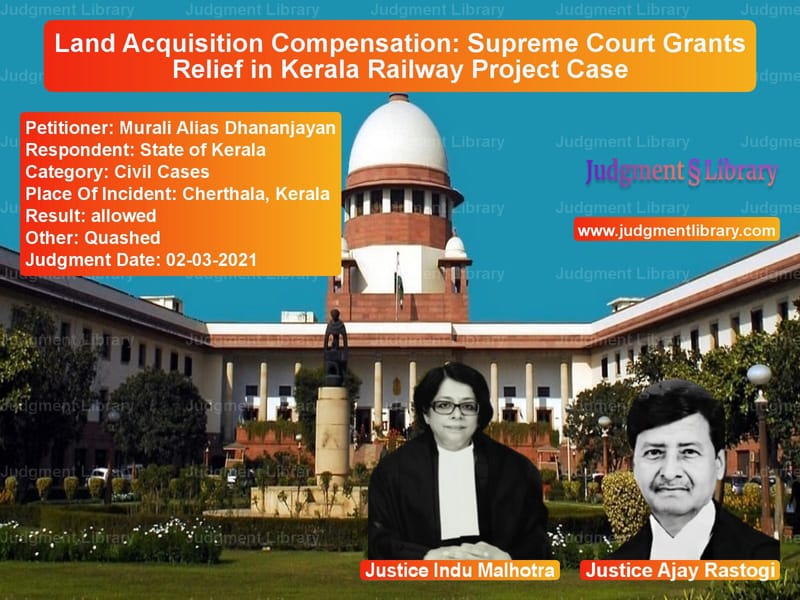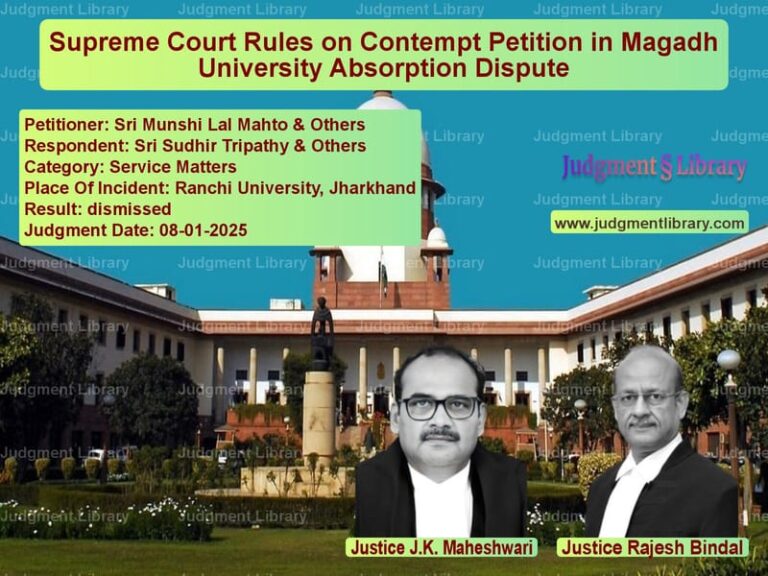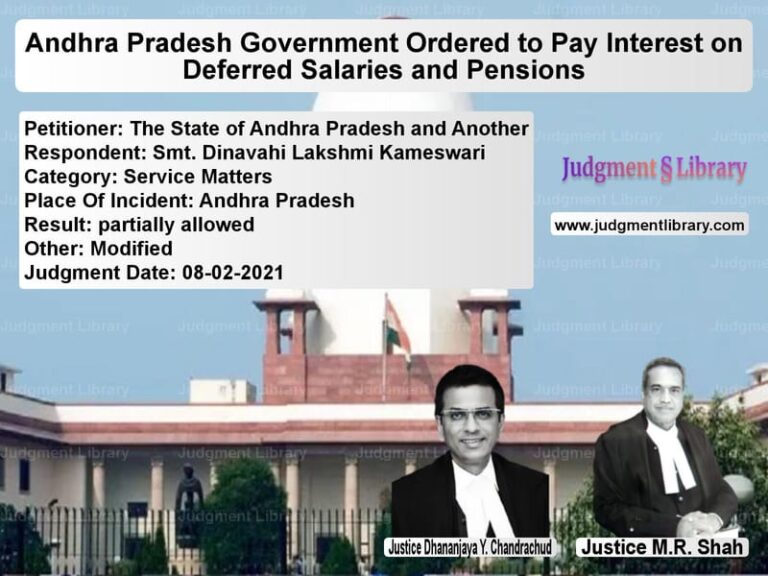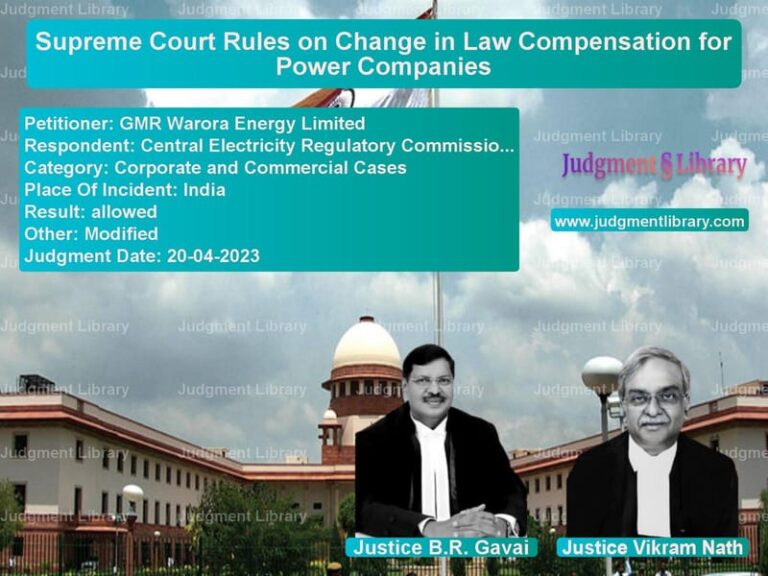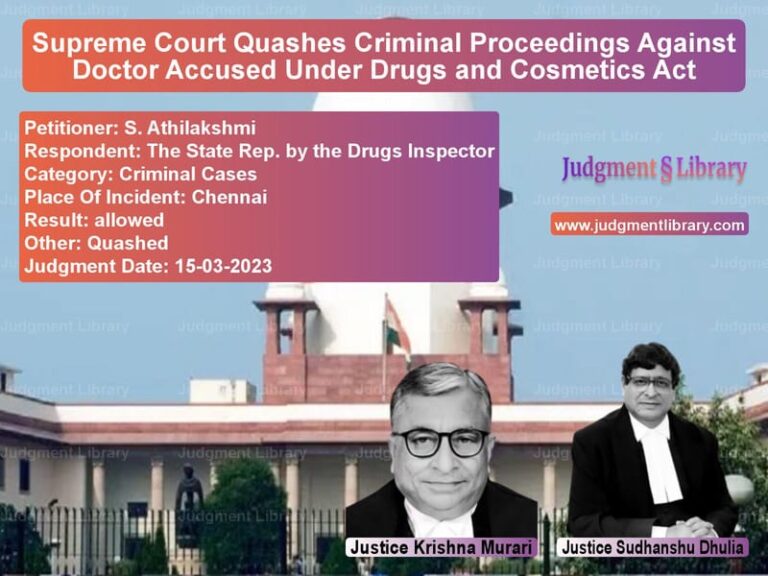Land Acquisition Compensation: Supreme Court Grants Relief in Kerala Railway Project Case
The case of Murali Alias Dhananjayan vs. State of Kerala pertains to the issue of land acquisition and fair compensation under the Land Acquisition Act, 1894. The Supreme Court had to decide whether the appellant, whose land was acquired for a railway project, was entitled to the same compensation as other landowners whose properties were acquired under the same notification.
Background of the Case
The dispute arose when the State of Kerala acquired 30.1 Ares of land owned by the appellant, Murali Alias Dhananjayan, under a notification issued on May 11, 1981. The land acquisition was for the construction of the Ernakulam-Alappuzha-Kayamkulam BG railway line. The appellant’s land, along with the land of his father and brother, was acquired under the same notification.
The Land Acquisition Officer awarded compensation of Rs. 454 per Are for wetland and Rs. 2,137 per Are for dry land. The appellant received a total compensation of Rs. 18,764.30 on April 29, 1982. However, dissatisfied with the compensation, the appellant, his father, and his brother filed reference petitions before the Subordinate Judge’s Court in Cherthala.
Legal Proceedings
In a judgment dated March 14, 2001, the Reference Court enhanced the compensation for the appellant’s father’s land to Rs. 8,500 per Are. A similar enhancement was granted to the appellant’s brother in a separate case. However, when the appellant’s reference petition was heard on August 2, 2001, his lawyer was absent, and the court recorded that the compensation determined by the Land Acquisition Officer was adequate.
The appellant later filed an application for restoration of his reference petition, citing his lawyer’s absence. The request was denied, leading him to file a writ petition in the Kerala High Court. On October 17, 2007, the High Court set aside the Reference Court’s order and restored the case for a fresh hearing. However, upon rehearing, the Reference Court once again dismissed the claim on the ground of limitation, stating that the reference petition was filed beyond six months from the date of knowledge of the Collector’s Award.
The appellant then filed another writ petition in the Kerala High Court, which was dismissed on the ground of inordinate delay in filing the reference. The appellant approached the Supreme Court, seeking parity with his father and brother in compensation.
Key Issues Before the Supreme Court
The Supreme Court examined the following legal questions:
- Whether the appellant was entitled to the same compensation as his father and brother, whose lands were acquired under the same notification.
- Whether the Reference Court erred in dismissing the case on limitation grounds despite the earlier High Court ruling restoring the reference petition.
- Whether the appellant could invoke Section 28(A) of the Land Acquisition Act, 1894, which allows for re-determination of compensation based on earlier awards in similar cases.
Arguments of the Parties
Petitioner’s Arguments (Murali Alias Dhananjayan):
- The land owned by the appellant, his father, and his brother was acquired under the same notification and was located in the same survey number.
- The Reference Court had awarded compensation of Rs. 8,500 per Are to the appellant’s father and brother, and denying the same rate to him was unjust.
- The earlier judgment of the Kerala High Court had directed the Reference Court to hear the case afresh, but the Reference Court dismissed it on limitation grounds without considering the merits.
- The appellant should be granted enhanced compensation based on parity with other similarly placed landowners.
The Supreme Court noted the petitioner’s argument: “We see no reason why the compensation awarded in L.A.R. No. 22/97 and L.A.R. No. 25/97 is not granted to the present Appellant at Rs. 8,500 per Are.”
Respondent’s Arguments (State of Kerala):
- The appellant’s reference petition was dismissed due to procedural lapses and delay in seeking legal recourse.
- The limitation period for filing a reference petition had expired, and the High Court was justified in dismissing the case on this ground.
- The Reference Court had already adjudicated the appellant’s claim, and reopening the matter after 15 years would set a bad precedent.
Supreme Court’s Analysis
1. Equal Compensation for Similarly Placed Landowners
The Supreme Court ruled that the appellant’s land was similarly situated to that of his father and brother, who had already been granted enhanced compensation. The Court held:
- “The Reference Court has not even adverted to the earlier judgments passed in L.A.R. No. 25/97 and L.A.R. No. 22/97, which granted a uniform rate of Rs. 8,500 per Are.”
- “There is no reasonable justification for treating the appellant differently.”
2. Rejection of the Limitation Argument
The Supreme Court found that the Reference Court erred in dismissing the petition on limitation grounds. The Court observed:
- “The High Court had already set aside the earlier order of the Reference Court and directed a fresh hearing. The Reference Court should have adjudicated the claim on its merits.”
- “Procedural delays should not result in denial of substantive justice, especially when similarly placed landowners have received higher compensation.”
3. Applicability of Section 28(A) of the Land Acquisition Act
The Court also referred to Section 28(A) of the Land Acquisition Act, which allows landowners to seek re-determination of compensation based on earlier awards in the same acquisition process. The Court stated:
- “The appellant had a legitimate expectation that he would receive compensation at the same rate as other landowners under the same notification.”
- “Denying him the benefit of enhanced compensation would violate the principles of fairness and equality.”
Final Judgment
The Supreme Court set aside the orders of the High Court and the Reference Court and granted the appellant compensation at the rate of Rs. 8,500 per Are. The key findings were:
- The appellant was entitled to the same compensation as his father and brother.
- The Reference Court erred in dismissing the case on limitation grounds.
- The appellant was entitled to solatium, additional compensation, and interest as per the provisions of the Land Acquisition Act.
This judgment reaffirms the principle that similarly placed landowners must be treated equally in land acquisition matters and that procedural lapses should not deprive individuals of their rightful compensation.
Petitioner Name: Murali Alias Dhananjayan.Respondent Name: State of Kerala.Judgment By: Justice Indu Malhotra, Justice Ajay Rastogi.Place Of Incident: Cherthala, Kerala.Judgment Date: 02-03-2021.
Don’t miss out on the full details! Download the complete judgment in PDF format below and gain valuable insights instantly!
Download Judgment: murali-alias-dhananj-vs-state-of-kerala-supreme-court-of-india-judgment-dated-02-03-2021.pdf
Directly Download Judgment: Directly download this Judgment
See all petitions in Property Disputes
See all petitions in Damages and Compensation
See all petitions in Specific Performance
See all petitions in Contract Disputes
See all petitions in Judgment by Indu Malhotra
See all petitions in Judgment by Ajay Rastogi
See all petitions in allowed
See all petitions in Quashed
See all petitions in supreme court of India judgments March 2021
See all petitions in 2021 judgments
See all posts in Civil Cases Category
See all allowed petitions in Civil Cases Category
See all Dismissed petitions in Civil Cases Category
See all partially allowed petitions in Civil Cases Category

